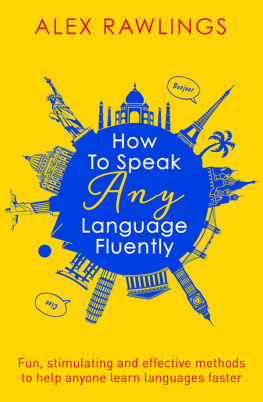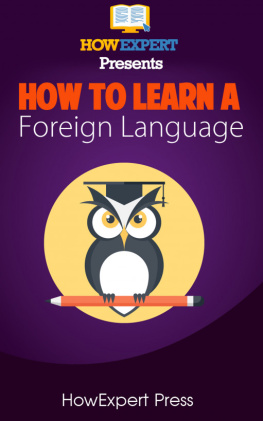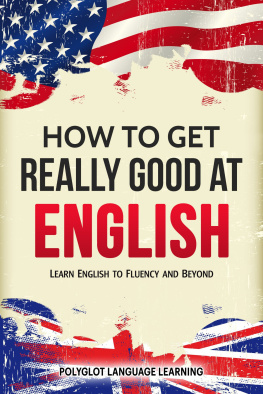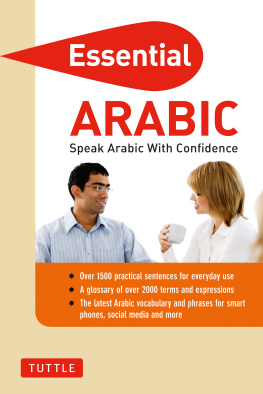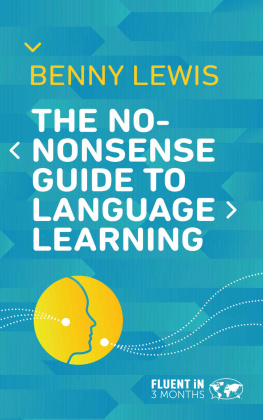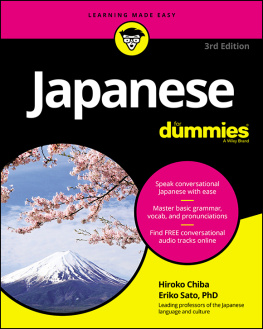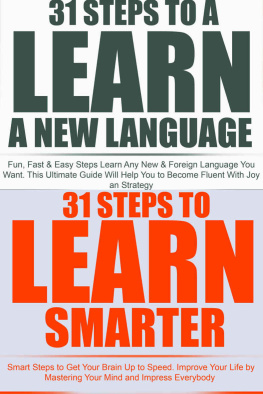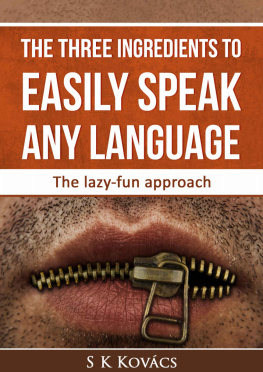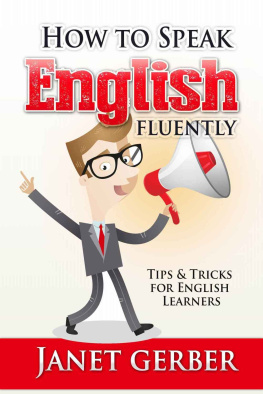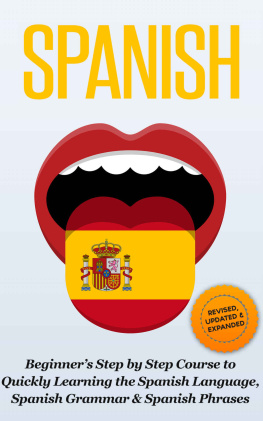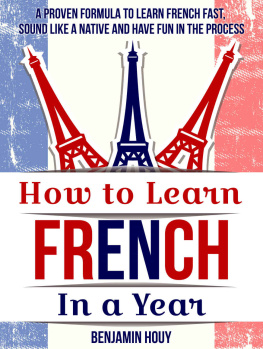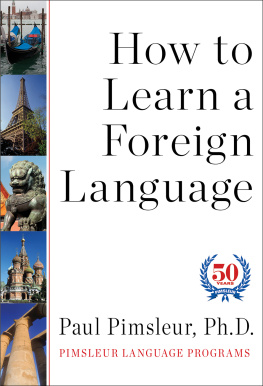Alex Rawlings is a language specialist with professional experience teaching, coaching and designing courses for multiple different languages. He was named Britains Most Multilingual Student after being tested for fluency in eleven different languages aged twenty and since then has gone on to study many more, including Russian, Hebrew and Hungarian. Alex has taken part in nationwide campaigns to promote multilingualism, has contributed to blogs run by the British Council and the European Commission, and his skills have been featured by news and media outlets in countries around the world. He is an organiser of the annual Polyglot Conference.
How to Speak Any
Language Fluently
Alex Rawlings
A How To Book

ROBINSON
First published in Great Britain in 2017 by Robinson
Copyright Alex Rawlings, 2017
The moral right of the author has been asserted.
p1: Quotation by Kat Lomb reproduced courtesy of TESL-EJ.
All rights reserved.
No part of this publication may be reproduced, stored in a retrieval system, or transmitted, in any form, or by any means, without the prior permission in writing of the publisher, nor be otherwise circulated in any form of binding or cover other than that in which it is published and without a similar condition including this condition being imposed on the subsequent purchaser.
A CIP catalogue record for this book is available from the British Library.
ISBN: 978-1-47213-857-6
Robinson
An imprint of
Little, Brown Book Group
Carmelite House
50 Victoria Embankment
London EC4Y 0DZ
An Hachette UK Company
www.hachette.co.uk
www.littlebrown.co.uk
How To Books are published by Robinson, an imprint of Little, Brown Book Group. We welcome proposals from authors who have first-hand experience of their subjects.
Please set out the aims of your book, its target market and its suggested contents in an email to .
Contents
A nyelv az egyetlen, amit rosszul is rdemes tudni. (Language is the only thing worth knowing even poorly.)
Kat Lomb (19092003) Hungarian translator and polyglot
Languages are one of those unique things in life that are always worth learning. Whether you know a lot or just a little, whether you speak them every day or once a year, and whether you speak many or just one, you are better off for knowing what you do than if you didnt know it at all. Even just a few words in a foreign language are better than knowing nothing at all.

Kat Lomb was one of the greatest language learners that the world has ever known. Including her native Hungarian, she worked as a translator in sixteen different languages and allegedly was able to speak many more to varying degrees of fluency. It is her quote that opens this introduction which has inspired me to learn languages more than any other. It is her non-perfectionist attitude to languages and desire to learn anything rather than nothing that I have tried to emulate in all areas of my life. Her outstanding success speaks for itself.
Being successful at learning languages is as much about the expectations you set yourself and the attitude you adopt as anything else. It is impossible to be a perfectionist in this sphere. You can score 100 per cent in tests, you can finish books and you can complete courses all you like, but no matter what milestone you reach, there will always be fresh ones appearing on the horizon.
Language learning never stops. No matter how much you know, there will always be more to learn. Nothing can change that, and the most successful language learners such as Kat Lomb recognise that and adjust accordingly, right from the start.
Learning a new language is an endlessly exciting and rewarding journey. As you set out on it, you can look forward to the exhilarating rush of learning new words, and the immense satisfaction of forming whole sentences and making yourself understood. These highs will always eclipse the lows, as you will realise one day that you cant imagine what life was like when you couldnt speak the language youre learning now.
The journey of learning a new language is a voyage of discovery. You will discover new cultures, new customs, and begin to see a whole new dimension of the world that you were blind to before. You will also gain new insights into human nature and humanity itself. You will meet people totally unlike anyone youve met before, and be able to connect with them in ways you never thought possible. But perhaps most importantly, you will discover a side of yourself that you never knew. You will learn how your mind works, why it remembers some things but not others, and what makes you motivated and what doesnt. Ultimately, a crucial segment of the journey of learning a new language is about learning how you learn.
At the time of writing, I have been dedicated to learning languages for just over ten years. I have studied fifteen different languages, and been on fifteen totally different adventures with them. Because of the experiences and opportunities each of these languages have brought me, I feel almost as though in those ten short years I have lived fifteen different lives.
At first, learning a new language was slow, it was frustrating, and it felt like an impossible task. I could never imagine what it would be like to feel confident enough to hold a conversation in a foreign language. I didnt really believe that I would ever experience that.
Thankfully, I carried on regardless. Time was on my side as I started very young, and I was fortunate to have multilingual role models in my family, such as my grandmother Aphroditi who was trilingual, and my great-aunt Gladys who spoke French, English, Greek, Arabic and Italian completely fluently. In the later stages of her life it became necessary to know bits of all of these to talk to her, as she started mixing them all into her sentences and was not always aware that she was switching language mid-sentence. She told me that for her Chaque langue est une autre personalit. (Each language is a different personality.) Each of the languages she spoke was a part of the story of her life, and by mixing them in her speech, she was defining who she was.
Through experience and with patience, I gradually found ways to make the way I learned languages more efficient, and better suited to me. This allowed me to learn languages faster, but also retain them in the longer term. As a language teacher and coach, I had the chance to experiment and see how my techniques could be adapted to suit people with different personality types to me, and start to see the commonalities between the approaches that worked for everyone. It is these commonalities that form the basis of this book.
Learning a new language is an extremely exciting, endlessly entertaining, and stimulating challenge. Whether you are looking for a way to start, or are in the middle of your journey and looking for ways forwards, this book will help you. It will offer fresh ideas, a wider perspective, and an overview of several different tried and tested techniques that will make your learning quicker, easier and much more enjoyable.
The process of learning a new language is inevitably a very personal process, which means that you may find that some techniques will agree with you more than others. This book is not designed to be an instruction manual, but a guide. The chapters are ordered logically, according to the kinds of questions that will arise as you progress through the different stages of learning your new language. However, it does not need to be read from cover to cover and can be dipped into as a reference whenever the need arises. The exercises at the end of each chapter will serve as a summary of the chapters key points, and also give you some things to think about and consider as you apply the advice and techniques that it outlines.
Next page
